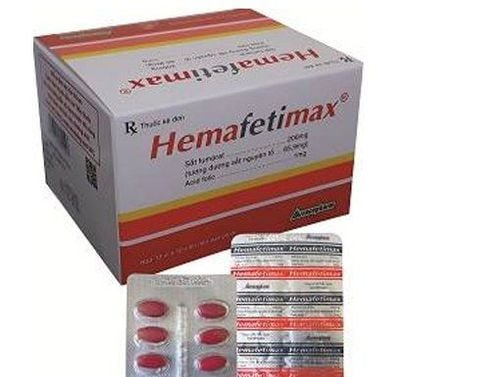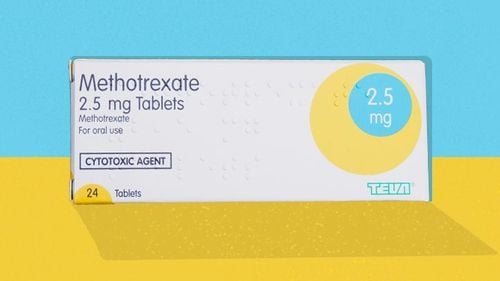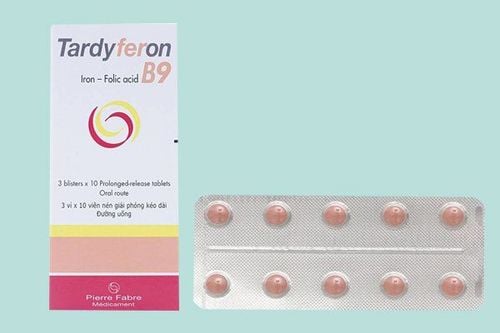This is an automatically translated article.
Folic acid is a water-soluble form of vitamin B. Folate occurs naturally in foods and folic acid is the synthetic form of this vitamin. Folic acid has been shown to have many health benefits.
1. What is folic acid?
1.1 The concept of folic acid Folic acid is a type of B vitamin commonly found in foods such as dried beans, peas, lentils, oranges or whole wheat products, liver, asparagus, radishes. sugar, broccoli, spinach...
Folic acid helps the body produce new cells to replace old and dead cells, and at the same time prevents abnormal changes in DNA. of cells - the cause of the appearance of cancer cells. Folic acid supplementation is a measure to treat folate deficiency and anemia. Folic acid may also be used in combination with certain other medications as directed by your doctor to treat pernicious anemia, aplastic anemia, or anemia caused by a lack of red blood cells. However, folic acid is not used in the treatment of vitamin B12 deficiency and spinal cord injuries.
1.2 Precautions when using folic acid Not recommended for people who have ever had an allergic reaction to folic acid Before using folic acid, talk to your doctor if the patient has kidney disease or infection or is an adult. Alcoholism or any type of anemia that has not been diagnosed and concluded Pregnant women with anemia should also consult their doctor before deciding whether to use folic acid to treat anemia 1.3 Additional dose Folic acid Usual dose for people with anemia: 1mg folic acid orally, or intramuscularly, subcutaneously or intravenously once a day. Use until clinical symptoms of folate deficiency have resolved or when blood tests are normal. Dosage for adults with folic acid deficiency: 400 to 800 micrograms per day orally, intramuscularly or subcutaneously. Dose for women of childbearing age, pregnant or lactating women: 800 micrograms of folic acid per day. It can be taken orally, intramuscularly, subcutaneously or intravenously.

Bổ sung acid folic ở phụ nữ mang thai cần theo liều lượng của bác sĩ chỉ định
Newborns with folic acid deficiency: 0.1 mg/day orally, intramuscularly or subcutaneously. For children from 0 to 5 years old, the amount of folic acid that needs to be supplemented every day is 10 times higher than that of infants, ie 1 milligram. Maintenance dose: for the first 10 years, supplement with 0.1 to 0.4 milligrams of folic acid daily. From 10 years or more the amount of the drug per day increases to 0.5 milligrams. 1.4 Some drugs cause bad interactions with folic acid For these drugs, it is necessary to change the dose according to the doctor's instructions in case folic acid supplementation is required:
Supportive drugs for cancer treatment such as: Raltitrexed Antiepileptic drugs containing phenytoin Immunosuppressants: methotrexate Drugs for treating urinary tract infections: nitrofurantoin Drugs to treat diseases related to parasites that contain pyrimethamine Antibiotics as an ingredient tetracycline One thing to keep in mind folic acid is a medicine so make sure to keep it out of the reach of children, out of direct sunlight and only as directed by your doctor. If you experience any unusual symptoms while taking the drug, you should immediately go to the nearest medical facility for timely support.
2. Side effects if overdose of folic acid
Folic acid exists in foods naturally as folate. Low blood folate levels can lead to certain birth defects (in infancy), heart disease, stroke, and is a risk factor for cancer. However, too much folic acid supplements can be harmful to health.
Acid folic xuất hiện trong thực phẩm tự nhiên dưới dạng folate
Most of the folate found in food is digested in the intestines before being absorbed into the bloodstream. In contrast, folic acid that is supplemented from different sources is converted to its active form in the intestinal wall and requires the help of the liver to convert it into folate before being released into the bloodstream. This process is relatively slow, so an overdose of folic acid can cause folic acid to accumulate in the blood leading to dangerous complications.
Here are the 4 most common side effects of folic acid excess:
High levels of folic acid can mask a vitamin B12 deficiency: The body uses vitamin B12 in red blood cell biosynthesis and keeps organs such as the heart, brain, and nervous system function optimally. Deficiency of vitamin B12 can cause reduced ability to function, over time will cause permanent damage to the nervous system, so a delayed diagnosis of B12 deficiency is especially worrisome. The body uses folate and B12 in the same way, which means the symptoms of a deficiency in either are similar. Folic acid supplements can prevent symptoms of vitamin B12 deficiency from being detected in time.
Accelerates the aging of nerve cells: Excess folic acid can accelerate the aging of nerve cells over time, especially for people with low vitamin B12 levels. A study conducted on people over 60 years of age with high blood folate levels due to regular folic acid supplementation rather than absorption from natural foods showed cognitive dysfunction, impaired memory loss more than normal people. Suppressing the baby's brain development: Adequate folate intake during pregnancy helps reduce the risk of birth defects as well as is necessary for the baby's brain development, so women of childbearing age, are Pregnant or nursing mothers are encouraged to take folic acid supplements. However, too much folic acid can interfere with the action of the hormone insulin and inhibit the brain development of children. In a recent study, children under the age of 5 whose mothers supplemented with 1,000 micrograms of folic acid per day during pregnancy (more than is necessary) scored lower on brain development tests than those who did not. mothers only use from 400 to less than 1000 micrograms of folic acid per day. Increases the growth of tumors: The mechanism of action of folic acid is to protect and enhance the growth of all types of cells, including cancer cells. They help cancer cells multiply and quickly metastasize to other organs. Men who had previously had prostate or colorectal cancer who received more than 1,000 micrograms of folic acid per day had a 1.7% to 6.4% higher risk of recurrence than the general population. But that's for other sources of folic acid, and getting folate from foods doesn't increase cancer risk.

Dùng acid folic quá liều có thể thúc đẩy khả năng phát triển của các khối u
Folic acid is a B vitamin that is found in many foods such as dried beans, peas, lentils, oranges or whole wheat products... in the form of folate. They have a protective effect on cells, promoting the formation of new cells to replace old cells.
People with folate deficiency may suffer from some diseases such as pernicious anemia or aplastic anemia... so providing enough folate for the body is necessary. However, an overdose of folic acid can lead to many undesirable effects such as accelerating the aging process of nerve cells, inhibiting the child's brain development, and enhancing the growth of tumors. u often hide vitamin B12 deficiency...
Customers can go directly to Vinmec Health system nationwide for examination or contact the hotline here for support.
Articles refer to sources: drugs.com, healthline.com, webmd.com













